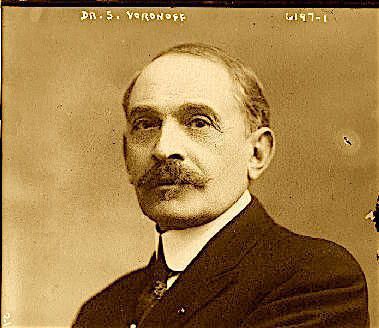
Dr.
Serge Voronoff studied medicine in France and became obsessed with the
idea of rejuvenating the human body with hormones. The best way to do
that, he figured, would be to transplant animal organs that produced
hormones into a human. Voronoff experimented on livestock, with
promising results, and decided that when he progressed to human
experiments, he would implant monkey glands, because of their
similarities to humans. He claimed a 1915 transplant of monkey thyroid
tissue produced improvement in a young Frenchman with developmental
disabilities.
In particular Voronoff again focused on
the power and impact of the sexual organs, specifically the testicles.
In his 1920 book, Life; a Study of the Means of Restoring Vital Energy
and Prolonging Life, Voronoff says, “The sex gland stimulates cerebral
activity as well as muscular energy and amorous passion. It pours into
the stream of the blood a species of vital fluid which restores the
energy of all the cells, and spreads happiness.” To Voronoff, the
process of taking healthy sexual gland tissue, such as bits of monkey
testicle, and sewing onto the testicles of aging humans, was to inject
the body with youth itself.
Dr. Voronoff’s first
monkey-testicle-to-man-testicle xenograft occurred in July of 1920. He
is said to have taken a small scrap of young monkey testicle just a few
centimeters wide and a few millimeters thin, and sewn it right into the
patient’s scrotum. Voronoff contested that the procedure could do
everything from return youthful energy to curing senility and
schizophrenia to radically prolonging life. An increase in sexual
ability was also of course implied, and tended to become the focus of
interest in his work, despite Voronoff’s repeated assertions that any
romantic improvements were just a side-effect of a transformation that
was healing the patient’s entire being, a process he called
“rejuvenation.”
You’d think men would be a bit
nervous about such surgery, but no -they clamored to have the
transplants done! Voronoff did at least 300 monkey testicle grafts, and
raked in the money. And he had even stranger ideas for further
experiments. Read about
Dr. Voronoff and his weird theories at Atlas Obscura.
 Dr.
Serge Voronoff studied medicine in France and became obsessed with the
idea of rejuvenating the human body with hormones. The best way to do
that, he figured, would be to transplant animal organs that produced
hormones into a human. Voronoff experimented on livestock, with
promising results, and decided that when he progressed to human
experiments, he would implant monkey glands, because of their
similarities to humans. He claimed a 1915 transplant of monkey thyroid
tissue produced improvement in a young Frenchman with developmental
disabilities.
Dr.
Serge Voronoff studied medicine in France and became obsessed with the
idea of rejuvenating the human body with hormones. The best way to do
that, he figured, would be to transplant animal organs that produced
hormones into a human. Voronoff experimented on livestock, with
promising results, and decided that when he progressed to human
experiments, he would implant monkey glands, because of their
similarities to humans. He claimed a 1915 transplant of monkey thyroid
tissue produced improvement in a young Frenchman with developmental
disabilities.
No comments:
Post a Comment